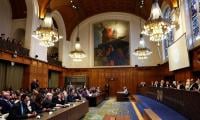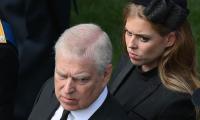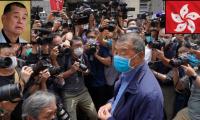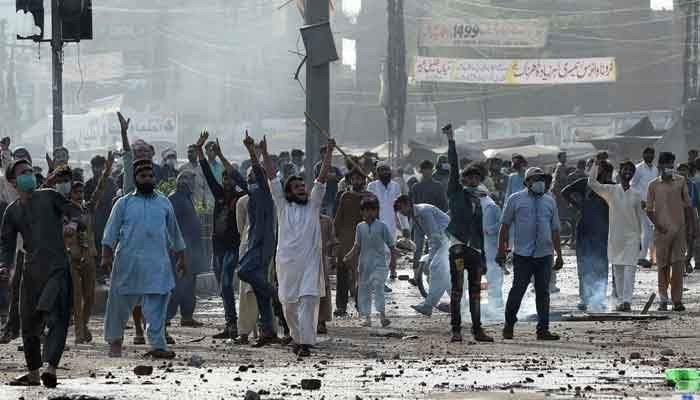Faizabad dharna commission: Who deviated from the principle of trichotomy of power?
Faizabad Dharna Commission asked, “Trichotomy of powers is the essential feature of the Constitution of Pakistan, then why this principle is not effectively working?”
ISLAMABAD: The Faizabad Dharna Commission during its inquiry asked the question why the Supreme Court of Pakistan took a different impression in the case when the government under the Constitution can seek necessary inputs from its various tiers, including intelligence agencies.
It also asked, “Trichotomy of powers is the essential feature of the Constitution of Pakistan, then why this principle is not effectively working?”
Another interesting question asked was, “Under Article 4 of the Constitution of Pakistan, all acts of the functionaries are to be in accordance with the law. All institutions derive authority from statutes. Then why there is a deviation?”
The commission asked these questions from Shahid Khaqan Abbasi, who was the prime minister when the TLP held a sit-in at Faizabad, which joins the twin cities of Rawalpindi and Islamabad.
During its probe, former prime minister Shahid Khaqan Abbasi was asked, “Under the Constitution and Rules of Business framed there-under policy making is the exclusive domain of the executive. The executive, however, can seek necessary inputs from various tiers of the government, including the intelligence agencies. Then why the Supreme Court of Pakistan has taken a different impression?”
Abbasi, however, told the commission that it would be improper for him to speculate on any impressions that the Supreme Court may have on the working of the government.
Abbasi was then asked, “Trichotomy of powers is the essential feature of the Constitution of Pakistan, then why this principle is not effectively working?” The former premier responded that whether the Constitution and its underlying principles are effectively working or not is a matter of opinion.
He was then asked, “Under Article 4 of the Constitution of Pakistan, all acts of the functionaries are to be in accordance with the law. All institutions derive authority from statutes. Then why there is a deviation?”
While asking another question, the commission stated that on 25th November 2017, law enforcement personnel used teargas and water cannon to disperse the TLP protestors but failed because they were not allowed to use firearms. It asked, “Why” (were the law enforcers not allowed to use firearms)
The then premier told the commission that the action taken by law enforcement personnel was carried out under the orders of the Islamabad High Court, which had expressly prohibited any use of firearms.
Abbasi was asked 24 questions. Some of the interesting questions asked and their answers are the following:
Q. Under what authority of law ISI is operating? Are there Rules and Regulations and SOPs?
Ans. The government of Pakistan through the Ministry of Defence issued a notification regarding establishment of an overall Inter-Services Intelligence organization vide letter No. 2722/13/JI(X) dated 2 September, 1948. The Inter-Services Intelligence Directorate functions under the Charter of Duties provided by the Cabinet Division, Government of Pakistan, vide letter No. 1352/PS/CS/75 dated 22 May, 1975.
Q. What is the mode of appointment of the chief of ISI? What is the prerogative of the Prime Minister for making such an appointment?
Ans. The General Headquarters, Pakistan Army, through the Ministry of Defence initiates the selection process for appointment of the Director-General of Inter-Services Intelligence Directorate; the appointment of Director-General is approved by the Prime Minister.
Q. To whom does the ISI chief report? Who evaluates his performance?
Ans. The Director General of the Inter-Services Intelligence Directorate has right of direct access to the Prime Minister as provided in the Raza Rafi Report of 1975. The performance evaluation of the Director-General is carried out as per the procedure and criteria laid down by the General Headquarters, Pakistan Army, for officers of his rank.
Q. Were you pressurised by any of the agencies not to initiate any action against the procession of TLP starting from Lahore and combined at Faizabad?
Ans. If the word ‘agencies’ in the question refers to the Intelligence Bureau or the Inter-Services Intelligence Directorate, the answer is in the negative.
Q. Why did you take a decision to hold negotiations despite the fact that TLP Dharna was declared as an unlawful assembly?
Ans. It is the responsibility of the government to protect the life and property of its citizens; all actions taken in dealing with the Faizabad Dharna were taken with this guiding principle as the basis to avoid any loss of life and to reach a resolution of the situation through negotiation with due consideration to the sensitivity of the issues involved.
Q. Why was the civilian face of District Magistrate, Chief Commissioner Islamabad or political leadership not in the field to deal with the rioters?
Ans. A ‘civilian face’ comprising federal ministers and officials of the Federal and Provincial Governments, Islamabad Capital Territory, Islamabad Police, Punjab Rangers, and the Inter-Services Intelligence Directorate were involved in dealing with the situation arising out of the Faizabad Dharna.
Q. Why was money distributed through the uniformed personnel?
Ans. Any distribution of money, whether by uniformed or civilian personnel, to the participants of the Faizabad Dharna was not sanctioned by the federal government.
Q. Who provided the money for distribution?
Ans. No money for distribution to participants of the Faizabad Dharna was provided by the federal government.
-
 Prince Harry Spokesperson Finally Reacts To Meghan Markle's UK Return Plan Claims
Prince Harry Spokesperson Finally Reacts To Meghan Markle's UK Return Plan Claims -
 Kim Kardashian Shares Terrifying Birthday Mishap
Kim Kardashian Shares Terrifying Birthday Mishap -
 'Stranger Things' Finale Documentary Has One Big Mystery Involving David Harbour, Winona Ryder
'Stranger Things' Finale Documentary Has One Big Mystery Involving David Harbour, Winona Ryder -
 Leonardo DiCaprio Leaves Fans Asking ONE Question After Golden Globes Appearance
Leonardo DiCaprio Leaves Fans Asking ONE Question After Golden Globes Appearance -
 Utah Cop 'turns Into Frog' In AI Police Report
Utah Cop 'turns Into Frog' In AI Police Report -
 Leonardo DiCaprio's Reaction To Nikki Glaser's Jokes At Golden Globes Goes Viral
Leonardo DiCaprio's Reaction To Nikki Glaser's Jokes At Golden Globes Goes Viral -
 Ofcom Opens Investigation Into Elon Musk’s X Over Grok AI Deepfakes
Ofcom Opens Investigation Into Elon Musk’s X Over Grok AI Deepfakes -
 Sarah Ferguson's Snake Phobia Complicates Her Next Move: Insider
Sarah Ferguson's Snake Phobia Complicates Her Next Move: Insider -
 Golden Globes 2026: 'The Pitt' And 'The Studio' Win Top Honors
Golden Globes 2026: 'The Pitt' And 'The Studio' Win Top Honors -
 Golden Globe 2026: Expert Defends Amanda Seyfried's 'mean' Reaction
Golden Globe 2026: Expert Defends Amanda Seyfried's 'mean' Reaction -
 Why Taylor Swift Docuseries, Travis Kelce Podcast Not Nominated For A Golden Globe 2026
Why Taylor Swift Docuseries, Travis Kelce Podcast Not Nominated For A Golden Globe 2026 -
 UN Court Opens Myanmar Rohingya Genocide Case: A Pivotal Test For International Justice?
UN Court Opens Myanmar Rohingya Genocide Case: A Pivotal Test For International Justice? -
 Sean Penn's Reaction Goes Viral After Brutal Nikki Glaser Roast
Sean Penn's Reaction Goes Viral After Brutal Nikki Glaser Roast -
 Royal Expert Reveals Two Major Reasons Behind Meghan Markle 'regal Return' To Britain
Royal Expert Reveals Two Major Reasons Behind Meghan Markle 'regal Return' To Britain -
 'Disgraced' Andrew’s Misconduct With Staff Exposed In Explosive Royal Biography
'Disgraced' Andrew’s Misconduct With Staff Exposed In Explosive Royal Biography -
 Hong Kong Court Begins Mitigation Hearing For Jimmy Lai Before Sentencing
Hong Kong Court Begins Mitigation Hearing For Jimmy Lai Before Sentencing




